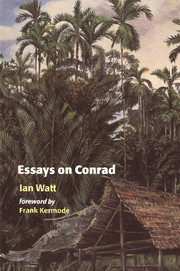Book contents
- Frontmatter
- Contents
- Foreword
- Acknowledgements
- Chapter 1 Joseph Conrad: alienation and commitment
- Chapter 2 Almayer's Folly: introduction
- Chapter 3 Conrad criticism and The Nigger of the ‘Narcissus’
- Chapter 4 Conrad's Heart of Darkness and the critics
- Chapter 5 Comedy and humour in Typhoon
- Chapter 6 The political and social background of The Secret Agent
- Chapter 7 ‘The Secret Sharer’: introduction
- Chapter 8 Conrad, James and Chance
- Chapter 9 Story and idea in Conrad's The Shadow-Line
- Chapter 10 The decline of the decline: notes on Conrad's reputation
- Chapter 11 Around Conrad's grave in the Canterbury cemetery – a retrospect
- Chapter 12 ‘The Bridge over the River Kwai’ as myth
- Index
Chapter 9 - Story and idea in Conrad's The Shadow-Line
Published online by Cambridge University Press: 22 September 2009
- Frontmatter
- Contents
- Foreword
- Acknowledgements
- Chapter 1 Joseph Conrad: alienation and commitment
- Chapter 2 Almayer's Folly: introduction
- Chapter 3 Conrad criticism and The Nigger of the ‘Narcissus’
- Chapter 4 Conrad's Heart of Darkness and the critics
- Chapter 5 Comedy and humour in Typhoon
- Chapter 6 The political and social background of The Secret Agent
- Chapter 7 ‘The Secret Sharer’: introduction
- Chapter 8 Conrad, James and Chance
- Chapter 9 Story and idea in Conrad's The Shadow-Line
- Chapter 10 The decline of the decline: notes on Conrad's reputation
- Chapter 11 Around Conrad's grave in the Canterbury cemetery – a retrospect
- Chapter 12 ‘The Bridge over the River Kwai’ as myth
- Index
Summary
Reviewing Conrad's first masterpiece, The Nigger of the ‘Narcissus’, Arthur Symons, though an admirer, complained that it had ‘no idea behind it’; and since then this objection has been not uncommon. It was most memorably expressed by E. M. Forster, who reviewed Conrad's collected essays, and found that they, at least, suggested that ‘the secret casket of his genius contains a vapour rather than a jewel; and that we need not try to write him down philosophically, because there is, in this particular direction, nothing to write. No creed, in fact. Only opinions’.
‘Opinions’ certainly; and they are often disconcertingly typical of the main social rôles to which fate successively introduced Conrad – the Polish landowner, the French clerical ultra, the English quarter-deck martinet. ‘No creed’, equally certainly; the word implies theological sanctions which had no interest for Conrad; although his rather frequent use of a tone of sacerdotal commitment may explain why Forster misses in Conrad what he would surely deplore in anyone else: the only creed to which Conrad, a child of nineteenth-century scepticism, would freely have said ‘Amen’ was Forster's own – ‘I do not believe in belief.’ As for ‘writing him down philosophically’, Conrad certainly did his best to discourage any such enterprise: ‘I don't know what my philosophy [of life] is’, he once wrote sardonically to Edward Garnett, ‘I wasn't even aware I had it.’
- Type
- Chapter
- Information
- Essays on Conrad , pp. 152 - 169Publisher: Cambridge University PressPrint publication year: 2000



